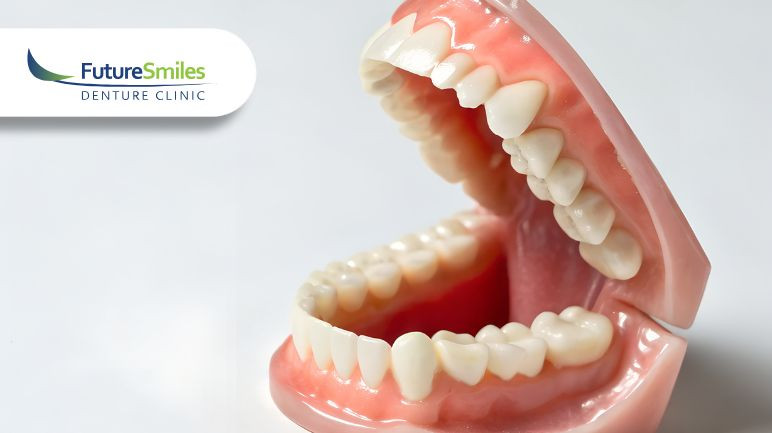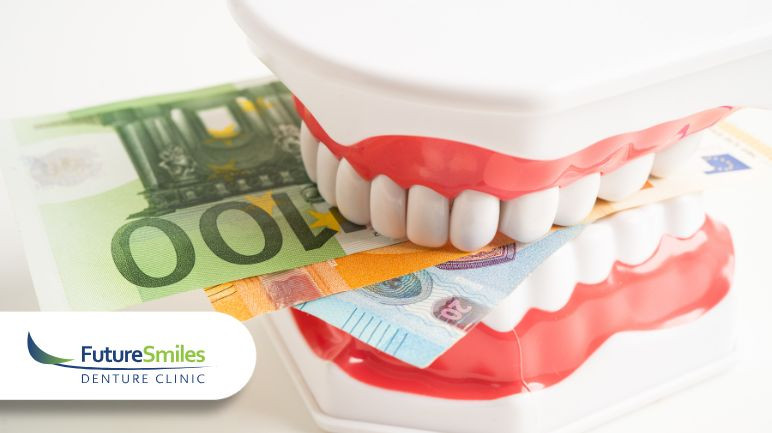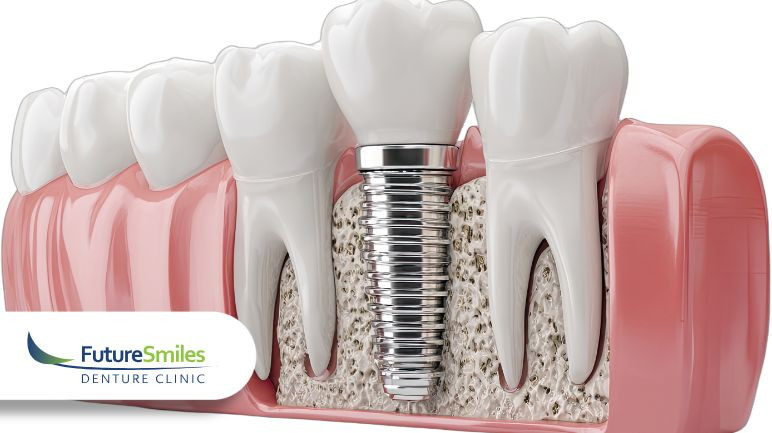While dentures are a convenient and comfortable tooth replacement option, first-time wearers may experience some discomfort. Here are 3 unwanted side-effects of dentures and how to combat them.
While partial/full dentures are an affordable and convenient option for patients who experience tooth loss, wearing them for the first time can be a challenging experience. It may require some time and patience to get used to the new sensation in your mouth.
During the first 30 days of wearing dentures, it’s normal to experience issues such as:
- Speech difficulties
- Not being able to eat what you want
- Changes to your sense of taste
- Mouth sores and blisters
Comprehensive Denture Care in Calgary
At Future Smiles, we offer a range of denture solutions from full/partial replacement teeth to implant-supported dentures to ensure that you find an option that best suits you.
We make every effort to fit your dentures or implants perfectly and are always on hand to advise you on any problems you are facing, so you can get back to enjoying a beautiful, healthy smile as quickly as possible.
3 Unwanted Side-Effects of New Dentures
Given that your mouth will naturally react to the placement of a foreign object in it, it should be expected that your dentures will take a while to get used to. During your process of adjustment, you might experience the following complications:
1. Diminished Sense of Taste
In the short-term, new denture wearers will likely experience some drop in their level of taste sensation. However, in time, it should return back to normal.
Other causes of a diminished sense of taste with new dentures can include:
- An overuse of denture adhesive
- Food debris becoming stuck to your dentures and creating an unpleasant taste
- Your upper-denture covering your upper hard palate, which contains the taste buds
- Your taste buds coming into contact with the dentures constantly, making you taste denture plastic along with your food
How to combat this problem
If you are wearing full/partial dentures and are experiencing some changes in your tastebuds, there are some simple steps you can take to combat this problem. These include:
- Keeping your dentures clean
- Making sure your dentures fit correctly
- Considering alternate tooth replacement options such as dental implants
2. Speech Difficulties
Experiencing speech problems due to a new set of dentures is very common, and will typically dissipate once you have gotten used to your new replacement teeth. These issues may include:
- Lisping: Dentures are a foreign object that take up significant space in the mouth, causing it to generate more saliva. This excessive salivation typically leads to lisping.
- Gargling speech: Your new dentures may move around a lot in your mouth due to excess salivation. As a result, some patients may find that they speak as if they are gargling or rinsing.
- Whistling sounds: The front teeth part of the dentures tend to be positioned differently from natural teeth. It may take some time for you to find this new position with your tongue when forming words. For this reason, a whistling sound may appear when you speak.
- Full mouth: When you wear dentures for the first time, it may feel as if you are speaking with a full mouth.
How to combat this problem
In time, your dentures will begin to feel natural and your speech will return to normal. However, you can practice and speed up the process by reading aloud and repeating words you have trouble pronouncing.
If these issues do not disappear as you get used to your new dentures, it is important to visit your denturist so that they can make the correct adjustments.
DENTURE REPAIRS & ADJUSTMENTS
3. Difficulty Eating and Chewing
Learning to eat and chew with your new set of dentures requires patience and practice. Some of the problems you may experience include:
- Your replacement teeth dislodging when you chew or bite down
- Mouth sores and blisters making it painful to chew
- Food collecting under your dentures
- Excess saliva production
How to combat this problem
It’s important to start slowly and choose soft foods that are easy to eat until your dentures are settled in and you feel comfortable eating solid foods again.
Here are some tips for eating with your new dentures:
- Chew slowly and thoroughly before you swallow.
- Distribute your food evenly on both sides in the back of your mouth when you chew.
- Avoid tough red meat and replace it instead with fish or poultry.
- Consider using a denture adhesive.
- Don’t hold liquids in your mouth for a long time as this may loosen your dentures.
- Avoid sticky foods.
Call Today
To learn more about how to get used to your new dentures, or to inquire about other tooth replacement options such as denture implants, contact our Calgary denture clinic at (403) 475-0016 or fill in our online contact form.






